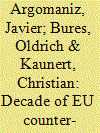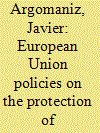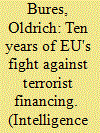|
|
|
Sort Order |
|
|
|
Items / Page
|
|
|
|
|
|
|
| Srl | Item |
| 1 |
ID:
136868


|
|
|
|
|
| Summary/Abstract |
This article critically examines the use and effectiveness of border controls in the European Union (EU)'s counter-terrorism policy. It shows that the EU has made substantial progress towards achieving the objectives that it had set for itself in this policy area, but has not managed to fulfil all of them, and certainly not by the deadlines originally set. It further argues that, contrary to their usual depiction in EU official documents, these border control measures make a limited contribution to the actual fight against terrorism, whilst having some negative effects. From that viewpoint, the fact that the EU has failed to meet all of its objectives in the use of border controls for counter-terrorist purposes may paradoxically be seen as a positive outcome.
|
|
|
|
|
|
|
|
|
|
|
|
|
|
|
|
| 2 |
ID:
136872


|
|
|
|
|
| Summary/Abstract |
In this article we seek to address the emerging role of the European Union (EU) as a security and intelligence actor from the perspective of counter-terrorism. Intelligence as a process and product has been strongly promoted by the EU as a useful and necessary tool in the fight against terrorism, radicalization, organized crime and public order problems. A range of agencies has been established that collect, analyze and operationalize intelligence in view of strategically defined security threats. Examples are Europol and Frontex. This article makes an inventory of their roles and competences in the field of intelligence and looks at the list of instruments that encourage the sharing of intelligence between different law enforcement and security agencies. Moreover, it is argued in this article that as intelligence becomes more hybrid and as the EU only holds light powers of oversight on ownership and integrity of data, considerable governance challenges lurk around the corner. As ‘intelligence’ is usually a complex and sensitive product, it often travels outside formal bureaucratic channels, which undermines accountability and transparency of where, how and for what purpose the intelligence was gathered.
|
|
|
|
|
|
|
|
|
|
|
|
|
|
|
|
| 3 |
ID:
136863


|
|
|
|
|
| Summary/Abstract |
The Treaty on the European Union (EU) stipulates that one of the key objectives of the Union is to provide citizens with a high level of safety within an Area of Freedom, Security and Justice (AFSJ). Given that the fight against terrorism is a prominent aspect of this general objective, it is remarkable that, in spite of its political relevance and decade-long history, it has only relatively recently received due attention in the academic community.1 At the time of writing, only a handful of post-9/11 edited volumes and special issues have focused on specific aspects of the EU counterterrorism efforts2 and initial monographs on the subject have only been relatively recently published by the three editors behind this special issue: Argomaniz3 has produced a theoretically informed assessment of the coherence of the EU response, Bures4 has examined the extent to which the EU can offer an added value in the fight against terrorism in Europe and Kaunert5 has studied how counter-terrorism has been a driver in the process of construction of the EU's AFSJ.
|
|
|
|
|
|
|
|
|
|
|
|
|
|
|
|
| 4 |
ID:
136869


|
|
|
|
|
| Summary/Abstract |
During the first decade after the 9/11 attacks, the European Union (EU) has developed into an international counter-terrorism actor in its own right, a role increasingly accepted by third countries. This is a result of many influences, including a more favourable legal basis after the Amsterdam Treaty reforms; enhanced institutional capabilities, such as the growing importance of the Counter-Terrorism Coordinator; the use of a broad range of instruments, such as intelligence sharing; and the application of geopolitical priorities, guided by meetings at the United Nations and the Council of Europe (among other fora). At the same time, the EU's counter-terrorism role has remained subsidiary, both legally and politically, to that of its member states. Furthermore, a lack of its own operational capabilities, its institutional complexity, and its problems of cross-policy coordination continue to act as powerful constraints on the EU's counter-terrorism responsibilities.
|
|
|
|
|
|
|
|
|
|
|
|
|
|
|
|
| 5 |
ID:
136867


|
|
|
|
|
| Summary/Abstract |
The challenge of violent radicalization is an important part of (the Prevent pillar) of the 2005 EU Counter-terrorism Strategy and is specifically dealt with in the 2005 EU Strategy for Combating Radicalisation and Recruitment to Terrorism. This article assesses the EU counter-radicalization approach by comparing the above mentioned strategies and other policy documents to theoretical notions on radicalization and counter radicalization. It focuses on the comprehensiveness, implementation and consistency of the EU policies that aim to prevent individuals from turning to violence, while halting the emergence of the next generation of terrorists.
|
|
|
|
|
|
|
|
|
|
|
|
|
|
|
|
| 6 |
ID:
136870


|
|
|
|
|
| Summary/Abstract |
The Lisbon Treaty, which entered into force in 2009, considerably reinforced the powers of the European Parliament. This article examines to what extent the European Parliament has become an important actor in EU counter-terrorism by focusing on the external dimension of this policy. It also analyses the impact that this potentially changing role has had on the external dimension of EU counter-terrorism. This article puts forward two inter-related claims. Firstly, the role of the European Parliament in the external dimension of EU counter-terrorism has significantly grown in recent years. Following the entry into force of the Lisbon Treaty in December 2009, the European Parliament has become a fully-fledged actor in the external dimension of EU counter-terrorism. Secondly, the reinforcement of the role of the European Parliament has also led to a strengthening of both accountability and oversight in the external dimension of EU counter-terrorism, although there are still some limitations in that respect.
|
|
|
|
|
|
|
|
|
|
|
|
|
|
|
|
| 7 |
ID:
136866


|
|
|
|
|
| Summary/Abstract |
This article aims to provide an assessment of the evolution and contribution since 2001 of the European Union infrastructure and transport protection policies to the European fight against terrorism. Using the avowed goals of the Protect strand of the 2005 EU Counter-terrorism Strategy as a yardstick, the intention here is to evaluate the extent to which reality matches the aspirations present in the European political discourse and in particular the overall aim of ‘strengthen[ing] the defences of key targets, by reducing their vulnerability to attacks, and also by reducing the resulting impact of an attack’. In this way, special attention is paid to the outcomes from a number of initiatives in the field such as the European Programme for Critical Infrastructure Protection (EPCIP), the Critical Infrastructure Warning Information Network (CIWIN), the Action Plan for the Enhancement of the Security of Explosives, the directives and regulations on aviation and maritime security and others. Continuing the pattern set out by the other contributions in this issue, the objective is to assess the degree to which initiatives have led to practical results, the political and institutional factors that have facilitated the process of policy development and implementation, the obstacles that have stood in the way of the practical realization of the initial objectives and, finally, lessons learnt.
|
|
|
|
|
|
|
|
|
|
|
|
|
|
|
|
| 8 |
ID:
136871


|
|
|
|
|
| Summary/Abstract |
With the 2001 EU Action Plan and the 2005 EU Counterterrorism Strategy, the European Union has unfolded a roadmap for counter-terrorism measures and an itinerary of actions to be undertaken by the Member States. In some respects, the EU strategies, flanked by the Action Plans in the Area of Freedom, Security and Justice, as well as more concrete forms of cooperation such as the adoption of the EU Arrest Warrant, the Member States have been encouraged to use the same conceptual apparatus, to adopt the precautionary logic (pre-terrorism), and to adopt similar organizational models (multi-disciplinary cooperation) and tools (surveillance, public-private cooperation, etc.). This may have led to a level of convergence between the national counter-terrorism approaches, in line with what the Action Plan on Organized Crime in 1997 sought to achieve by demanding from Member States that they would adapt their national structures. The number of policy-impulses that has emanated from the EU Counterterrorism strategy and ensuing policy documents has been rather numerous. Moreover, this article seeks to take stock of whether all proposals have led to the full adoption and implementation of instruments. The article assesses whether the EU strategies have encouraged ‘deep integration’ between the Member States in terms of a common threat assessment, pooling resources, sharing intelligence, mutual legal assistance in anti-terrorist investigations, creating joint investigation teams and transferring suspects between Member States. The primary focus of this article will be on levels of legal convergence between six Member States.
|
|
|
|
|
|
|
|
|
|
|
|
|
|
|
|
| 9 |
ID:
136865


|
|
|
|
|
| Summary/Abstract |
This article builds a model for explaining the development of supranationalism in EU police cooperation, especially concerning Europol. This framework is also helpful for understanding the role of police cooperation in EU counter-terrorism policy. The article begins with a critical analysis of the analytical framework first development in my 2003 book and refines this based key events since 2002, as well a few important scholarly perspectives. According to the new model, supranationalism is explained by ‘interest shapers,’ which include the ‘spillover-enlargement effect,’ crises and shocks, and concerns for national sovereignty, democracy, and pragmatism. The development of these interests and the resulting supranationalism are also affected by ‘institutional dynamics,’ including entrepreneurship, path dependency, and bureaucratic resistance. These factors help to explain recent events and predict future developments concerning EU police cooperation.
|
|
|
|
|
|
|
|
|
|
|
|
|
|
|
|
| 10 |
ID:
136864


|
|
|
|
|
| Summary/Abstract |
This article offers a critical assessment of the post-9/11 efforts of the European Union (EU) in the fight against terrorist finances. Using the EU's own goals from its action plans and counterterrorism strategies as the baseline criteria, it examines how successful the EU has been in implementing the relevant aspects of various United Nations Security Council counterterrorism resolutions, the special recommendations of the Financial Action Task Force, and its own measures spanning across all of its three pre-Lisbon pillars. In particular, the article seeks to answer the following questions: (1) What and how much of its own counter-terrorism plans has the EU managed to achieve since 9/11? and (2) What lessons can be learned from the hitherto successes and failures for future EU efforts to counter terrorist financing? Special attention is paid to the thus far neglected role of the private sector in the fight against terrorist financing.
|
|
|
|
|
|
|
|
|
|
|
|
|
|
|
|
|
|
|
|
|